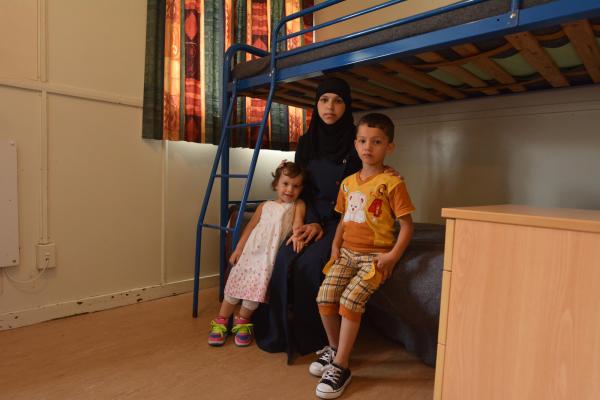We live in an age of unease. Many of us feel on the verge of economic, social, and political crises and face fear when we do such simple things as hop on the internet, travel to see family, or even walk out our front door.
If ours is a time of destruction, violence, fear, and uneasiness so too was the 8th-century world of a prophet named Micah.
Micah was a rural outsider who criticized the establishment and spoke out against injustice and bad religion in Jerusalem. The Judea he lived in was one of stupendous upheaval. Armies were moving upon the nation of Israel to the north and the specter of Assyrian forces sweeping in from the east to destroy Jerusalem and force the people into exile was just on the historical horizon.
Into this context Micah warned both kingdoms of their impending judgment because they had not been faithful to God’s covenant. Micah recognized that all kingdoms, regardless of their supposed religious character, were guilty when it came to injustice, cruelty, and pride.
Micah also promised that God’s justice and love were being delivered — no matter how distant such concepts seemed amid war and turmoil, uncertainty and fear — and he doubled-down in declaring that God’s future restoration was still to come.
Seeing the parallels between Micah’s time of unease and ours, it would behoove us to lean in for a listen when Micah writes, “He has shown you, O mortal, what is good. What does God require of you? That you act justly and love mercy and to walk humbly with your God.” (Micah 6:8)
Views toward Muslims continue to grow increasingly negative. Indeed, a Pew Research Center study found that the U.S. public’s views of Muslims were more negative than toward any other religious group. And this data only tells part of the story: Every day Muslims in the U.S. — and around the globe — bear the brunt of Islamophobia and inter-religious violence in flesh and blood. Their life is too often one of anxiety, tension, and threats of terror.
It is, therefore, important to ask: Where’s the justice and compassion and humility from Christians toward our Muslim neighbors?
It’s sadly lacking. Although some Christians act as allies alongside their Muslim neighbors, most either are too apathetic to mobilize or others have stronger feelings of anger and antipathy toward Muslims than the general population.
Micah reminds us that our religion isn’t just about worship, tithing, dressing up in our best duds for services and fellowship functions, or acting according to a particular party line.
Instead, Micah roared in from the rural counties to tell the city dwellers of Jerusalem — and us today — that our call is to do what is fair and just to our neighbor, to be compassionate and loyal in our love, and to not take ourselves too seriously, but to take God seriously.
What does this look like when it comes to our Muslim neighbors?
1. Act Justly: Defend their rights.
To act justly we must first recognize the injustice meted out against Muslims every day. We must identify and call out the negative feelings about Islam present in our communities and see how these negative feelings are being used to justify the mistreatment of Muslims.
We must be unequivocal in denouncing such sentiments of malcontent. We must let our Muslim neighbors know that we do not agree and be there for them to let them know — in word and deed — that they are appreciated members of our community.
We should offer to be their allies — not their benevolent champions — and truly and sincerely care about their well-being. As their allies, we should commit to do everything we can to defend their rights and ensure they are treated with the dignity they deserve.
2. Love Mercy: Reach out with compassionate friendship.
Regardless of culture, creed, country, or carefully constructed conceptions of “the religious other” we should be ready to love others and do what kindness requires of us. And yet, at this moment in time we must recognize that the injustice against Muslims is potent and in particular need of our attention.
Therefore, looking to the example of Jesus who sat with Samaritans, ate with tax collectors, and became friends with other groups who ranked low on first-century public opinion surveys (see John 4, Luke 7, 14), Christians are called to take up Jesus’ cue and pursue radical relationships in the face of Islamophobia.
A recent study by Public Religion Research Institute shows that people who interact with Muslims — even those who have just had a few conversations in the past year — hold much more positive views of Muslims and refugees.
We must move from a posture of hostility to one of hospitality. We must not be concerned for our safety, but be compassionate and supple to the prompting of the Spirit as we are invited to get to know our Muslim neighbors at work, in our neighborhood, or through formal relationships formed between congregations and mosques. Perhaps, in time, we can come to appreciate the shared humanity and dignity in each of our situations and not see each other as “Christian” and “Muslim,” but simply as friends.
3. Walk humbly: We cannot rebuild the brokenness of the world on our own.
In all of this, we must not take ourselves — our politics, religion, or philosophies — too seriously. Instead, we must take God and his work seriously.
In our pursuit of justice and our desire to show mercy we will falter, fumble, and fail. We will make missteps and mistakes; we will neglect to speak up and act foolishly. The good news is that God is ready to forgive, ready to set us back on the road, and ready to lead us again in the ways of justice and mercy.
Moreover, walking humbly with God means coming to the realization that our efforts at peacemaking and restorative justice — no matter how vital and essential they are — will not put make this world fully whole again. There will remain broken pieces.
Hate. Fear. Injustice. Cruelty. They will all continue to exist in some shape and form.
Walking humbly with our God is faithfully trusting that his justice, mercy, and love are at work in this world and that, in the end, he will finish what he’s started and make all things new.
Got something to say about what you're reading? We value your feedback!

